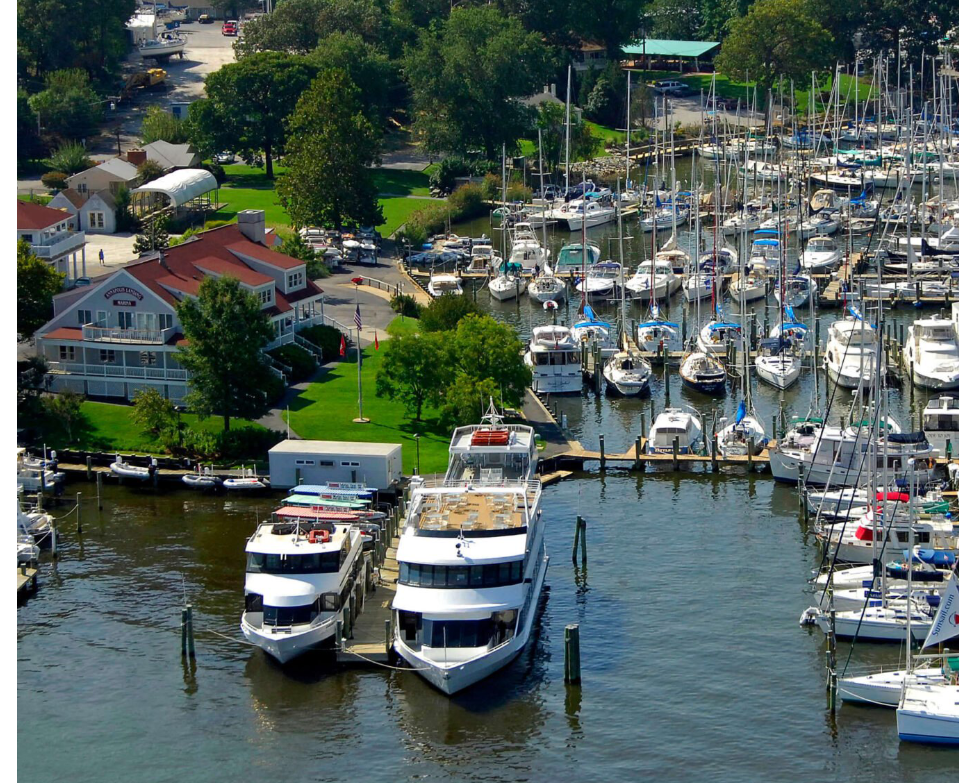Annapolis City Council members are planning a task force to take on floating Airbnbs, houseboats, liveaboard boaters, and overnight charters—and the plan is rocking the boat along the city’s waterfront.
A resolution by two Annapolis aldermen seeks to gather “information necessary for the Annapolis City Council to make informed decisions about residential and commercial marine vessels in city waters.”
Under the resolution, the task force would “investigate three critical areas regarding houseboats, floating homes, and other residential marine vessels.” According to the resolution, the areas to be investigated include:
- Impact on the city’s maritime industry,
- Advantages and disadvantages to the community,
- Impact on city operations.
This task force, the resolution states, would be required to submit a report to the City Council for possible action. The resolution, introduced by Aldermen Ross Arnett and co-sponsored by Alderman Rob Savidge, states that that city “needs to assess how residential housing in boat slips affects the availability of slips for powerboats and sailboats,” saying that these boats are essential for “fostering and maintaining the city’s maritime community atmosphere.”
The resolution points to other cities where regulations have been imposed on residential vessels. In Ocean City in 2024, the resort town banned the use of houseboats for short-term rentals “to protect the public’s health, safety and welfare.” In Sausalito, California, the 400 “floating homes” in the city’s 28 residential marinas are required to have permanent electrical, sewer, and water connections above the waterline, and backflow prevention devices. The council resolution argues that the City needs to assess managing utilities like drinking water and electricity connections, as well as sewage removal.
The resolution also calls for the task force to assess fees for marinas and people living on vessels, saying that residents rely on essential city services funded by property taxes (but they are not paying property taxes).
The controversy began with the question who should be included among “Residential Marine Vessels”. The resolution spells out what the council’s definition is:
- Houseboat, a dwelling built on a boat that has a motor;
- House-barge, a dwelling built on a barge without a motor;
- Floating Home, another name for a house-barge;
- Liveaboard, a boat that a person uses as their home;
- Charter Boat, a vessel rented to passengers with or without a captain and subject to Coast Guard regulations;
- Bed and Breakfast Charter, a recreational vessel that offers overnight stays for a fee and is subject to Coast Guard regulations;
- Short-term Rental, a marine vessel rented for short-term stays without leaving the dock.
Concerns about waste disposal from house-barges and short-term rental houseboats had been raised because the city’s pumpout boat can’t serve house-barges and commercial vessels at the dock. It may serve recreational boats (licensed, which can operate under their own power) only.
The liveaboards—people who live on their sailboats and powerboats (rather than houseboats or commercial Airbnbs) in neighborhoods like Eastport don’t believe the added oversight of their utilities is necessary. As recreational vessels, some use the city’s pumpout service, which they find sufficient, others taken advantage of bathhouse amenities at their marina. They argue that their marina slip fees address the city services they use, similar to apartment-dwellers’ rent payments and are opposed to paying property tax on top of the marina fees.
Similarly, there are concerns that marina owners may not want to deal with excessive regulations, and may begin turning away liveaboards as a result.
Janet Neves, who lives aboard a 44-foot motoryacht with her daughter, addressed the Annapolis City Council Monday evening, says that the marina community is “already subject to strict regulations through marinas, insurance, and inspections every few years.”
Fellow liveaboard boater Merry O’Brien says the references to liveaboard boaters in the resolution should be struck, and the word “residential” should be replaced with “commercial”, which would cover Airbnbs, charter boats, and short-term rentals.
“Neighbors are not concerned about us,” she says. “They’re concerned about the commercial rentals.”
Many have lived along the water for years, some for decades. They say that living aboard embodies the vibrant maritime atmosphere the City Council is trying to preserve. Neves calls it a “unique and beautiful way of living,” and a “quintessential Annapolis experience.”
Mayor Gavin Buckley echoed this sentiment, saying, “There is nothing more Annapolis than living on a boat.” He opposes the task force.
Buckley supports regulating the total number of houseboats allowed throughout the city, but believes it should be up to individual marinas whether they want to allow houseboats or not.
Several amendments have already been added to the resolution. In a small victory for liveaboard boaters worried about being swept up in the houseboat rules, an amendment added Monday night changes the title of the task force from “Houseboat, Floating Home, and Other Residential Marine Vessels” to “Houseboat, Floating Home, and Other Commercial Marine Vessels”.
The task force would be made up of 15 people appointed by Buckley and confirmed by City Council. It would include members of the maritime industry, watershed association, recreational boaters, liveaboards, commercial boaters, the waterside community, city residents outside of the waterfront, the port warden chair, and a representative of the city’s Maritime Advisory Board. The task force would hold regular meetings open to the public and be overseen by the Harbormaster.
Ultimately on Monday evening, Mayor Buckley and Alderman Sheila Finlayson voted against the task force resolution, but it passed with a majority. The mayor’s office will now begin selecting task force members.




